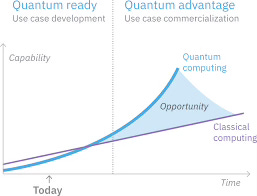A very quick refresher on quantum computing: Current computers work on bits that are on or off (or 0 or 1 (apologies for all the “ors.”)) Thus, in a BASIC manner all computations work off the power of 2^x. Quantum computing bits have more than 2 states, so their computing power is 3 or 4 to the x. This exponentially makes things like:
Problem solving for complex problems like: encryption, molecule building and simulation, logistics and complex hydro and thermodynamic systems (cough, cough weather)
Quantum computing can explore multiple logic paths simultaneously thus we should be able to solve multi-variant problems like financial modeling, drug discovery, and materials science.
Data safety as quantum computers could be used to create unbreakable encryption codes.
Revolutionizing artificial intelligence via more powerful and efficient algorithms.
But there’s been one major hurdle impeding quantum computer development. Inconsistency. Remember those bits with more than two states? From the first paragraph? Well, sometimes those bits just randomly change and this, understandably, has made quantum calculations unreliable.
Recently, scientists at Harvard and MIT in conjunction with a company called QuEra Computing have made some advanced. As per this paper in Nature, something really, really, really good has happened! Scientists have found a way to store information across multiple qubits, like spreading eggs in different baskets. To further this metaphor, increasing the chances that one egg won’t be spoiled. This new bit (or "super qubit") is developed with up to 280 regular qubits, is much tougher and less prone to errors. This is a big step towards more powerful and reliable quantum computers!
Because stronger qubits means more accurate qubits, which means more confidence in complex calculations (alliteration alert!) and that means we are closer to the reality This research of real-world applications of quantum computing.
It's like taking a shaky stepladder and turning it into a sturdy bridge! We're one step closer to building powerful quantum computers that can solve problems beyond our wildest dreams.
Call me a techno-optimist, but quantum computing is going to make our lives and our understanding of our lives much better.
That’s a good thing.





